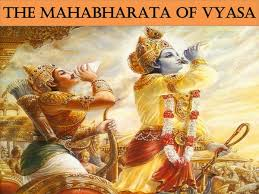The Mahabharata: A Timeless Epic of War, Wisdom, and the Human Experience
The Mahabharata is an ancient Indian epic that is considered one of the greatest works of world literature. Composed in Sanskrit, it tells the story of a dynastic struggle for the throne of the Kingdom of Hastinapur, which ultimately leads to a devastating war between two factions of the same family.
The central characters in the Mahabharata are the five Pandavas, who are the rightful heirs to the throne, and their cousins, the Kauravas, who unjustly rule the kingdom. The story follows the Pandavas as they face numerous trials and tribulations, including exile, betrayal, and a gambling match in which they lose everything they have.
As the conflict between the Pandavas and the Kauravas escalates, the gods and goddesses of the Hindu pantheon become involved, taking sides and intervening in the affairs of mortals. The Bhagavad Gita, one of the most famous texts in Hinduism, is a central part of the Mahabharata, and it contains a dialogue between the god Krishna and the warrior Arjuna, in which Krishna explains the nature of the universe and the importance of fulfilling one's duty.
The Mahabharata culminates in the devastating Kurukshetra War, in which thousands of warriors are killed. The Pandavas emerge victorious, but at a great cost, and the epic ends with the death of many of the central characters and the eventual ascension of the Pandavas to the throne.
Throughout the Mahabharata, the themes of dharma (righteousness), karma (the consequences of one's actions), and the importance of fulfilling one's duty are central. The epic also explores the nature of power, family, and the relationships between humans and the divine.
The Mahabharata is a vast and complex work, with numerous subplots and characters, and it continues to be a source of inspiration and wisdom for people around the world.
The Mahabharata is not just a story, but a vast repository of knowledge and wisdom, covering a wide range of topics such as ethics, philosophy, politics, religion, and spirituality. The epic is believed to have been composed over a period of several centuries, with contributions from many different authors and scholars.
One of the most remarkable aspects of the Mahabharata is its portrayal of complex and multifaceted characters. The heroes of the epic are not just paragons of virtue, but flawed and conflicted individuals, with their own strengths and weaknesses. The characters of the Mahabharata are deeply human, and their struggles and dilemmas are as relevant today as they were thousands of years ago.
The Mahabharata also features several strong and powerful female characters, who play important roles in the story. The most famous of these is Draupadi, the wife of the Pandavas, who is a symbol of strength, courage, and dignity. Other notable female characters include Kunti, the mother of the Pandavas, Gandhari, the mother of the Kauravas, and Satyavati, the mother of the Pandavas' father.
The Mahabharata has had a profound impact on Indian culture and society, and it continues to be a source of inspiration and guidance for millions of people around the world. The epic has been translated into many different languages, and has influenced literature, art, music, and philosophy across the globe.
In addition to its literary and cultural significance, the Mahabharata also has a deep spiritual and philosophical dimension. The epic is a source of knowledge and wisdom for those seeking to understand the nature of reality, the purpose of human existence, and the relationship between humans and the divine. The Mahabharata contains profound insights into the human condition, and offers a roadmap for living a fulfilling and meaningful life.
The Mahabharata is not only an epic tale of conflict and war, but also a rich source of spiritual and philosophical teachings. One of the central themes of the Mahabharata is the concept of dharma, or righteous action. The characters in the epic are constantly grappling with questions of duty, morality, and ethics, and are forced to make difficult choices in order to uphold their principles.
The Mahabharata also contains deep insights into the nature of the universe and the human experience. The Bhagavad Gita, which is a part of the Mahabharata, is considered one of the most important texts in Hinduism, and contains a profound dialogue between the god Krishna and the warrior Arjuna. In the Gita, Krishna explains the nature of reality, the importance of detachment and equanimity, and the need to act in accordance with one's dharma, or righteous duty.
The Mahabharata also offers a nuanced exploration of the relationship between humans and the divine. The gods and goddesses of the Hindu pantheon are not distant or aloof figures, but active participants in the affairs of mortals, intervening in the lives of the characters and shaping the course of events. The Mahabharata portrays a complex and multifaceted relationship between humans and the divine, in which both are intimately connected and intertwined.
The Mahabharata has had a profound impact on Indian culture and society, and has inspired countless works of art, literature, and music. The epic continues to be a source of guidance and inspiration for millions of people around the world, offering a roadmap for living a fulfilling and meaningful life, and providing insights into the nature of the universe and the human experience.



Comments
Post a Comment